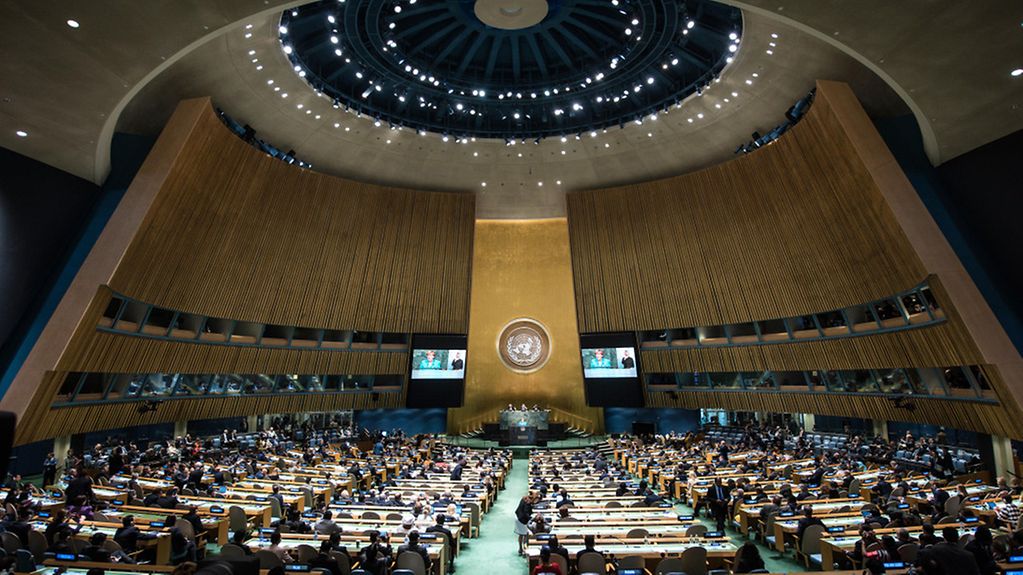Frequently asked questions about the UN
What happens at the United Nations, and what is Germany’s role? A round-up of the facts.
4 min reading time

Germany is working with Brazil, Japan and India to reform the United Nations
Photo: Bundesregierung/Kugler
What is the UN?
The UN, or United Nations is an international organisation that brings together 193 states. It was founded in 1945 in the wake of the Second World War with a view to putting in place an institution that could effectively secure world peace and resolve problems arising between nations. Today the UN’s mandate no longer embraces only ensuring respect for international law and human rights, and fostering international cooperation. It also includes, for instance, climate change mitigation and sustainable development.
What is the UN General Assembly?
The General Assembly is the central decision-making body of the United Nations. Every year between September and December the representatives of all 193 member states come together to discuss global policy issues. Non-member states include Taiwan, the Vatican City State, the Palestinian territories, North Cyprus, the Western Sahara and a few Pacific island states.
The General Assembly debates all issues that fall within the mandate of the Charter of the United Nations, including world peace, international security and international cooperation. Every member state, irrespective of its size or population, has one vote at the General Assembly.
What is the UN Security Council?
Under the provisions of Article 24 of the Charter of the United Nations, the Security Council bears the primary responsibility for the maintenance of international peace and security. It consists of five permanent members (France, the United Kingdom, the USA, Russia and China) and ten non-permanent members. The non-permanent members are elected for a two-year period.
The resolutions of the Security Council are binding for all UN members and require the support of nine members, whereby all permanent members have the right of veto, allowing them to block any resolution. The measures that the Security Council can adopt go from calling for the peaceful resolution of a conflict, to mediating in conflicts, and imposing non-military sanctions or military intervention.
On 1 January 2019 Germany will begin its sixth two-year period as a non-permanent member of the United Nations Security Council, thus assuming important responsibility for peace in the world.
What does Germany do at the United Nations?
Since the Federal Republic of Germany was admitted to the United Nations on 18 September 1973 – along with the then German Democratic Republic (GDR) – Germany’s wide-ranging engagement has steadily increased. Germany is the fourth largest contributor to the UN’s two-year budget and to the budget for UN peace missions. In 2019 and 2020 Germany will also be a non-permanent member of the Security Council.
What will Germany be working for in the Security Council?
Germany intends to use its seat on the Security Council primarily to work for the four core objectives of peace, justice, innovation and partnership. Over and above this, the German government is particularly engaged in the fields of crisis prevention, climate change and security, as well as on global health issues – all areas well known as the watchwords of Germany’s policy at the UN. The German government also considers it important that European interests are taken into more account in the Security Council.
For this reason Chancellor Angela Merkel proposed to the German Bundestag that Germany should use its seat as a non-permanent member of the Security Council in 2019 and 2020 in part to advance European concerns and interests. Germany is also active in efforts to reform the United Nations.
How should the United Nations be reformed?
It is important that the Security Council remains able to take action and to respond appropriately to global challenges and crises. It must also remain a credible representative of the global community. Thus, the German government is working to bring it into line with the realities of the 21st century.
For the German government this means primarily ensuring that the countries of the global South and the major contributors to the UN are appropriately represented. With its G4 partners, Brazil, Japan and India, Germany has been advocating a reform of this sort within the scope of negotiations ongoing since 2009 in an informal plenary of the UN General Assembly.
Why is the UN important for Germany?
The German government is convinced that global challenges can only be effectively addressed if the international community works together. From climate change to nuclear non-proliferation, security and human rights the United Nations offers an important forum that has already been able to achieve major results. The United Nations Security Council is the only body in the world that can make resolutions that are then binding under international law.
Moreover, the resolutions of the United Nations enjoy unique political legitimacy, since they are often adopted with the agreement of all member states and thus represent the will of the international community.
What is the 2030 Agenda?
In the 2030 Agenda for Sustainable Development, UN member states set themselves 17 Sustainable Development Goals or SDGs, which they aim to achieve together by 2030. The SDGs include eliminating extreme poverty and hunger, creating a sustainable environment, improving global health, overcoming inequality and building institutions.